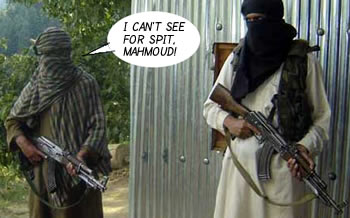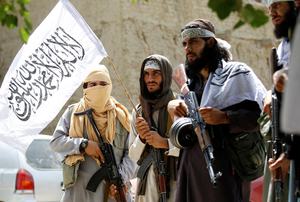 Pakistani militants Mohib and Amir used to cross the porous border from the Waziristan region of northwest Pakistan to neighboring Afghanistan whenever they had the urge to fight U.S.-led forces. But their trips have stopped since Waziristan tribal leaders struck a deal with Pakistani authorities last month barring militants from entering Afghanistan from the semi-autonomous tribal state. Pakistani militants Mohib and Amir used to cross the porous border from the Waziristan region of northwest Pakistan to neighboring Afghanistan whenever they had the urge to fight U.S.-led forces. But their trips have stopped since Waziristan tribal leaders struck a deal with Pakistani authorities last month barring militants from entering Afghanistan from the semi-autonomous tribal state.
Sitting cross-legged in a bazaar near the Afghan border, the two bearded militants say the arrangement is an inconvenience rather than a barrier to their goals to wage "jihad", or holy war, against U.S.-led forces in Afghanistan. "The border is not just in Waziristan," 25-year-old Mohib, who declined to give his full name, said with a smile as he sat in a market stall in Miranshah, the main town of Pakistan's North Waziristan border region. "If you can't go into Afghanistan from Waziristan, you can go from other areas. There are many, many other ways to go," he told Reuters, stroking his beard with one hand, while holding an AK-47 assault rifle with the other.
| since the deal was clinched, attacks against U.S.-led NATO troops and Afghan government forces have tripled in eastern Afghanistan |
The September 5 pact signed between tribal leaders and pro-Taliban forces and the government has ended clashes between militants and Pakistani security forces in which hundreds of people have been killed this year. The Pakistani government believes the arrangement will enable it to stem a growing tide of "Talibanization" among members of the conservative and fiercely independent Pashtun tribes who live in six semi-autonomous tribal states along the Afghan border. In return for curbing Taliban and al Qaeda activity, Pakistan has pledged to take a much lower profile in Waziristan.
But since the deal was clinched, attacks against U.S.-led NATO troops and Afghan government forces have tripled in eastern Afghanistan, especially in areas bordering North Waziristan. Nevertheless, the United States and Afghanistan have adopted a wait-and-see approach with the accord under which militants in Waziristan promised to halt attacks inside Pakistan as well as across the border in Afghanistan.
| Some wear badges on their chests reading "Appointed by the office of the Taliban, the mujahideen of the North Waziristan Agency". |
Critics fear the Waziristan pact risks creating havens for al Qaeda and Taliban fighters. But Pakistani officials say the deal will empower tribal elders to control militants in their region. These days, Pakistani forces are nowhere to be seen and government officials keep low profiles in their offices. Instead, long-haired, bearded militants wearing skull caps and with AK-47 rifles slung over their shoulders, roam Miranshah and the nearby town of Mir Ali. Some wear badges on their chests reading "Appointed by the office of the Taliban, the mujahideen of the North Waziristan Agency".
Mujahideen, or "holy warriors", flocked to the border region in the 1980s to battle Soviet invaders in Afghanistan. Many left Afghanistan and sought refuge in Waziristan after U.S.-led forces ousted Afghanistan's Taliban in 2001. From there, they infiltrated back into Afghanistan to fight foreign and government troops, until last months' deal.
| Near Miranshah's main bazaar, the militants have opened an office in an Islamist madrasa, where their officials settle disputes among Pashtun tribesmen. |
Near Miranshah's main bazaar, the militants have opened an office in an Islamist seminary, or madrasa, where their officials settle disputes among Pashtun tribesmen. "We are responsible for maintaining law and order in the bazaar," Eid Niaz, the deputy head of the office, told Reuters as tribesmen sat in a circle, waiting to plead their cases on issues such as disputes with neighbors.
Under the deal, tribes can be held responsible and punished for any violation to the agreement in line with tribal law. Punishment includes having vehicles confiscated by the government and shops and houses demolished or sealed. Residents said crime had fallen since the militants took over security responsibilities in the region, though several people accused of being "American informers" had been killed. "We're happy that they have taken charge of law and order. We don't have robberies anymore," said one resident.
The situation is similar to that in adjacent South Waziristan, where militants virtually took over after months of fighting with Pakistani forces. Many locals oppose President Pervez Musharraf and his support for the U.S.-led war on terrorism. Before the latest deal was reached, | Haqqani, who is also a firebrand cleric, said they were not sending militants into Afghanistan but still offered "moral support" to those fighting jihad there. |
Taliban commanders in Afghanistan urged their allies in North Waziristan to stop fighting Pakistani forces and concentrate on jihad in Afghanistan instead, militant sources told Reuters.
Maulana Abdul Khaliq Haqqani, a member of a militant council, or shura, said his followers were strictly abiding by the pact, though he said the government had yet to keep its promises, such as compensation for families of those killed in the fighting. Haqqani, who is also a firebrand cleric, said they were not sending militants into Afghanistan but still offered "moral support" to those fighting jihad there. "There is no doubt that we support this jihad against infidels, against these Christians who have invaded a Muslim land ... We support oppressed people in Afghanistan and we pray for their success," he said. |
 stood in front of him and said they had a question, and then they shot at Mawlavi and killed a vibrant and prominent scholar of this country," said Sayed Abu Bakr.
stood in front of him and said they had a question, and then they shot at Mawlavi and killed a vibrant and prominent scholar of this country," said Sayed Abu Bakr.
 ...Arabic for
...Arabic for  ...the Pashtun equivalent of men...
...the Pashtun equivalent of men... Pakistani militants Mohib and Amir used to cross the porous border from the Waziristan region of northwest Pakistan to neighboring Afghanistan whenever they had the urge to fight U.S.-led forces. But their trips have stopped since Waziristan tribal leaders struck a deal with Pakistani authorities last month barring militants from entering Afghanistan from the semi-autonomous tribal state.
Pakistani militants Mohib and Amir used to cross the porous border from the Waziristan region of northwest Pakistan to neighboring Afghanistan whenever they had the urge to fight U.S.-led forces. But their trips have stopped since Waziristan tribal leaders struck a deal with Pakistani authorities last month barring militants from entering Afghanistan from the semi-autonomous tribal state.